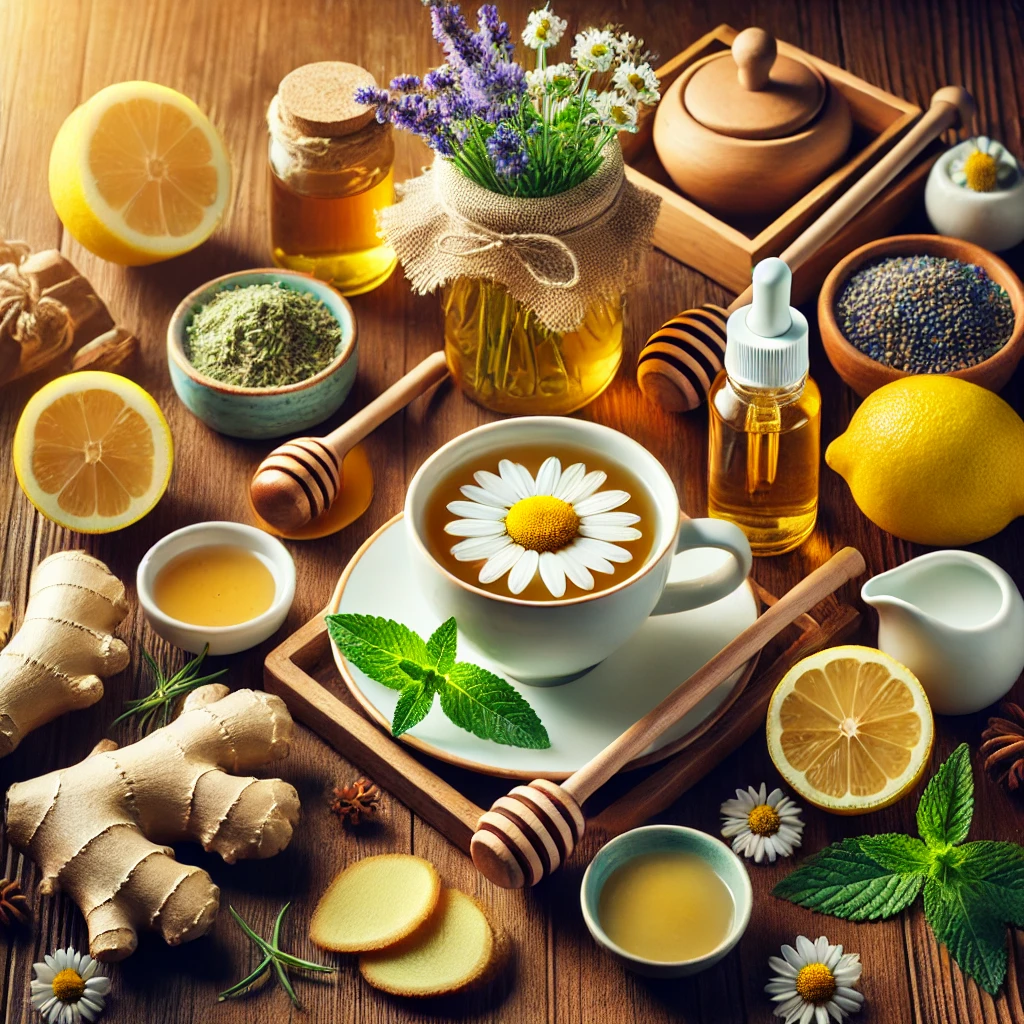Natural Remedies for Common Health Issues
In today’s world, many people are seeking natural and alternative approaches to managing their health. Whether it’s to avoid the side effects of pharmaceuticals or to embrace more holistic practices, natural remedies can offer practical and effective solutions for common ailments. From colds and headaches to digestive issues, natural and home-based remedies have been used for centuries and are backed by both tradition and science. In this in-depth article, we will explore a variety of natural remedies that you can use to alleviate common health problems, offering a gentle yet effective approach to wellness.
1. Natural Remedies for Colds and Flu
The common cold and flu are viral infections that can cause a range of symptoms, including sore throat, congestion, coughing, and fever. While there is no cure for these viral infections, natural remedies can help alleviate symptoms and support the immune system.
A. Honey and Lemon Tea
How It Helps: Honey has antibacterial and antiviral properties, while lemon is rich in vitamin C, which can boost the immune system. Together, they soothe a sore throat and reduce coughing.
How to Use: Mix a tablespoon of honey and the juice of half a lemon in a cup of warm water. Drink this tea 2-3 times a day to relieve symptoms.
B. Ginger Tea
How It Helps: Ginger has anti-inflammatory and antiviral properties that can help reduce congestion and soothe a sore throat.
How to Use: Slice fresh ginger and boil it in water for 10 minutes. Strain and add honey for taste. Drink this tea 2-3 times a day.
C. Steam Inhalation with Eucalyptus Oil
How It Helps: Eucalyptus oil is known for its decongestant properties and can help clear nasal passages.
How to Use: Add a few drops of eucalyptus oil to a bowl of hot water. Cover your head with a towel and inhale the steam for 5-10 minutes.
2. Natural Remedies for Headaches
Headaches can be caused by a variety of factors, including stress, dehydration, and tension. Natural remedies can help alleviate pain without the need for over-the-counter medications.
A. Peppermint Oil
How It Helps: Peppermint oil has a cooling effect that can help relax muscles and reduce tension headaches.
How to Use: Dilute a few drops of peppermint oil with a carrier oil (like coconut or almond oil) and apply it to your temples and the back of your neck. Massage gently for relief.
B. Magnesium-Rich Foods
How It Helps: Magnesium deficiency is linked to headaches and migraines. Consuming magnesium-rich foods can help prevent and reduce the frequency of headaches.
How to Use: Include magnesium-rich foods in your diet, such as spinach, almonds, avocado, and dark chocolate.
C. Hydration
How It Helps: Dehydration is a common cause of headaches. Ensuring adequate hydration can help prevent and alleviate headache symptoms.
How to Use: Drink plenty of water throughout the day. Adding a slice of lemon or cucumber can make water more appealing and refreshing.
3. Natural Remedies for Digestive Issues
Digestive problems like bloating, indigestion, and constipation can be uncomfortable and disruptive. Natural remedies can help soothe the digestive tract and promote healthy digestion.
A. Peppermint Tea
How It Helps: Peppermint tea relaxes the muscles of the gastrointestinal tract, which can help relieve symptoms of bloating, gas, and indigestion.
How to Use: Brew a cup of peppermint tea by steeping peppermint leaves in hot water for 5-10 minutes. Drink after meals to aid digestion.
B. Apple Cider Vinegar
How It Helps: Apple cider vinegar can help balance stomach acid levels and improve digestion. It is also believed to have prebiotic properties, supporting gut health.
How to Use: Mix one tablespoon of apple cider vinegar with a glass of water and drink before meals to improve digestion.
C. Ginger for Nausea
How It Helps: Ginger has been used for centuries to treat nausea and vomiting. It can help settle the stomach and reduce feelings of nausea.
How to Use: Chew on a small piece of fresh ginger, or make ginger tea by boiling sliced ginger in water. Drink this tea when experiencing nausea.
4. Natural Remedies for Skin Irritations and Minor Wounds
Skin irritations and minor wounds can be bothersome, but natural remedies can promote healing and provide relief without harsh chemicals.
A. Aloe Vera
How It Helps: Aloe vera has anti-inflammatory and antimicrobial properties that can soothe irritated skin and promote healing of minor burns and wounds.
How to Use: Apply fresh aloe vera gel directly to the affected area. Repeat several times a day until the skin heals.
B. Coconut Oil
How It Helps: Coconut oil has moisturizing and antimicrobial properties that can help soothe dry, irritated skin and promote healing.
How to Use: Apply a thin layer of coconut oil to the affected area. Use as needed for relief.
C. Calendula
How It Helps: Calendula is known for its anti-inflammatory and wound-healing properties. It can help reduce inflammation and speed up the healing process.
How to Use: Apply calendula cream or ointment to minor cuts, scrapes, or irritated skin 2-3 times a day.
5. Natural Remedies for Insomnia and Sleep Issues
Getting a good night’s sleep is essential for overall health. Natural remedies can help promote relaxation and improve sleep quality without the need for prescription medications.
A. Chamomile Tea
How It Helps: Chamomile tea has calming effects that can help relax the mind and body, promoting better sleep.
How to Use: Brew a cup of chamomile tea by steeping chamomile flowers in hot water for 5-10 minutes. Drink before bedtime to help relax and prepare for sleep.
B. Lavender Essential Oil
How It Helps: Lavender oil has a calming scent that can reduce anxiety and promote relaxation, making it easier to fall asleep.
How to Use: Add a few drops of lavender oil to a diffuser, or sprinkle a few drops on your pillow before bed.
C. Valerian Root
How It Helps: Valerian root is a herb known for its sedative properties, which can help improve sleep quality and reduce the time it takes to fall asleep.
How to Use: Valerian root can be taken as a supplement or brewed into a tea. Consult with a healthcare provider for the appropriate dosage.
6. Natural Remedies for Allergies
Seasonal allergies can cause symptoms like sneezing, runny nose, and itchy eyes. Natural remedies can help alleviate these symptoms and provide relief.
A. Local Honey
How It Helps: Consuming local honey is believed to help build immunity to local pollen, reducing allergic reactions.
How to Use: Take a teaspoon of local honey daily to help reduce allergy symptoms over time.
B. Quercetin
How It Helps: Quercetin is a natural antihistamine found in foods like apples, onions, and berries. It can help reduce allergic reactions.
How to Use: Include quercetin-rich foods in your diet or take quercetin supplements. Consult with a healthcare provider for the appropriate dosage.
C. Neti Pot
How It Helps: A neti pot can help flush out allergens and mucus from the nasal passages, reducing congestion and sinus pressure.
How to Use: Use a saline solution in a neti pot to rinse your nasal passages once or twice a day during allergy season.
Conclusion
Natural remedies can offer effective and gentle solutions for a variety of common health issues. From soothing a sore throat with honey and lemon to promoting better sleep with chamomile tea, these remedies harness the healing power of nature to support your well-being. While natural remedies can be beneficial, it’s important to remember that they may not be suitable for everyone, and some conditions may require medical attention. Always consult with a healthcare provider before starting any new treatment, especially if you have existing health conditions or are taking medications.
Embracing natural remedies is about finding balance and making informed choices that support your overall health. By incorporating these natural solutions into your daily routine, you can take a proactive approach to managing your health and well-being.





Recent Comments